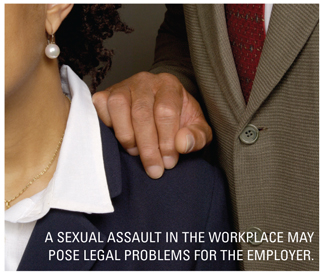 If one of your employees sexually assaults someone on the job, is your company liable? The answer depends on the extent to which the company created the opportunity for the assault to occur. Three main legal theories come into play here: negligent hiring, negligent retention, and respondeat superior. If the victim is able to prove each element in court, the victim would be able to recover a judgment against the company based on that theory.
If one of your employees sexually assaults someone on the job, is your company liable? The answer depends on the extent to which the company created the opportunity for the assault to occur. Three main legal theories come into play here: negligent hiring, negligent retention, and respondeat superior. If the victim is able to prove each element in court, the victim would be able to recover a judgment against the company based on that theory.
Negligent Hiring
To prove negligent hiring, the victim must show: 1) The employer was required to make an appropriate investigation of the employee and failed to do so; 2) an appropriate investigation would have revealed the employee was unsuitable for the job; and 3) it was unreasonable for the employer to hire the employee in light of the information the employer knew or should have known.
The type of background investigation required depends on the type of work. For example, an investigation may need to be more thorough if the prospective employee would be entering customers' homes as opposed to working outdoors. Still, there is no strict requirement for the employer to check with law enforcement agencies about an employee's possible criminal record, even where the employee is to regularly deal with the public. In fact, even actual knowledge of the employee's criminal record does not establish the employer's negligence in hiring him. This is because Florida's public policy is to give criminals a chance to turn their lives around and obtain gainful employment.
Recommended For You
Want to continue reading?
Become a Free PropertyCasualty360 Digital Reader
Your access to unlimited PropertyCasualty360 content isn’t changing.
Once you are an ALM digital member, you’ll receive:
- Breaking insurance news and analysis, on-site and via our newsletters and custom alerts
- Weekly Insurance Speak podcast featuring exclusive interviews with industry leaders
- Educational webcasts, white papers, and ebooks from industry thought leaders
- Critical converage of the employee benefits and financial advisory markets on our other ALM sites, BenefitsPRO and ThinkAdvisor
Already have an account? Sign In Now
© Touchpoint Markets, All Rights Reserved. Request academic re-use from www.copyright.com. All other uses, submit a request to [email protected]. For more inforrmation visit Asset & Logo Licensing.







